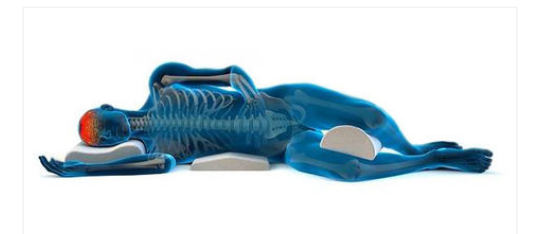Side, supine and prone, which kind of sleeping position is more healthy?

In the near future, researchers have found that this sleeping position (the most commonly used sleeping position for humans and many other animals) may be most conducive to the cleanliness of brain waste relative to supine and prone. And the researchers also believe that the side can reduce the risk of suffering from Alzheimer's disease (Alzheimer's disease) and other neurological diseases.

is, the brain used to clean up the "garbage" system. The accumulation of brain wastes may cause some neurological disorders, such as Alzheimer's disease, Parkinson's syndrome, and so on. Professor Maiken Nedergaard found that the brain lymphoid system pathway can remove waste and other harmful chemicals in the brain.
In the past few years, Dr. Benveniste of Stony Brook University used the method of magnetic contrast-enhanced magnetic resonance imaging (MRI) to observe and identify lymphoid pathways in the brain of rodents. He found that cerebrospinal fluid (CSF) was able to remove waste by filtration and interchangeable with interstitial fluid (ISF), which is very similar to the method of removing waste from organs in the body's lymphatic system. Side of the most beneficial to the brain waste treatment is also the researchers use the same method to observe the human brain after the lymphoid pathway found.

newspaper
Side, supine and prone, which kind of sleeping position is more healthy?
Science House 2015-09-02 Read 38429
In the near future, researchers have found that this sleeping position (the most commonly used sleeping position for humans and many other animals) may be most conducive to the cleanliness of brain waste relative to supine and prone. And the researchers also believe that the side can reduce the risk of suffering from Alzheimer's disease (Alzheimer's disease) and other neurological diseases.
Photo Description: The brain lymphoid system pathway can remove harmful waste from the brain, especially when sleeping. While the side is proved to be the most conducive to the removal process of the sleeping position. Source: Stony Brook UniversityPhoto Description: The brain lymphoid system pathway can remove harmful waste from the brain, especially when sleeping. While the side is proved to be the most conducive to the removal process of the sleeping position. Source: Stony Brook University
Before the foreign media reports, 2013 University of Rochester (University of Rochester) neuroscientist Maiken Nedergaard found the human brain lymphoid system, that is, the brain used to clean up the "garbage" system. The accumulation of brain wastes may cause some neurological disorders, such as Alzheimer's disease, Parkinson's syndrome, and so on. Professor Maiken Nedergaard found that the brain lymphoid system pathway can remove waste and other harmful chemicals in the brain.
In the past few years, Dr. Benveniste of Stony Brook University used the method of magnetic contrast-enhanced magnetic resonance imaging (MRI) to observe and identify lymphoid pathways in the brain of rodents. He found that cerebrospinal fluid (CSF) was able to remove waste by filtration and interchangeable with interstitial fluid (ISF), which is very similar to the method of removing waste from organs in the body's lymphatic system. Side of the most beneficial to the brain waste treatment is also the researchers use the same method to observe the human brain after the lymphoid pathway found.
Photo Description: The study at the Stony Brook University shows that the side is more effective in removing brain wastes than other sleeping conditions (such as supine or prone), and these wastes can cause neurological diseases.Photo Description: The study at the Stony Brook University shows that the side is more effective in removing brain wastes than other sleeping conditions (such as supine or prone), and these wastes can cause neurological diseases.
When people are asleep, the brain's lymphoid pathway is the most efficient. Brain wastes include beta amyloid and tau proteins that, once accumulated, can adversely affect the brain. Dr. Benveniste and colleagues used dynamic contrast-enhanced magnetic resonance imaging (MRI) to quantify the exchange of cerebrospinal fluid and tissue fluid in the brain of anesthetized posterior, supine and prone rodents. "The results show that the lateral lymphoid system has the highest transport efficiency compared to supine and prone, so we recommend that physical posture and sleep quality be incorporated into future standardized diagnostic imaging procedures," Dr. Benveniste said. Human cerebrospinal fluid and tissue fluid exchange transport, to determine the removal of brain protein to bring the pros and cons of brain disease.

Researchers at the University of Rochester Lulu Xie, Rashid Deane and Maiken Nedergaard validated the data obtained from nuclear magnetic resonance imaging using fluorescence microscopy and radiotracer, and analyzed the effect of sleeping position on brain removal of amyloid. Dr. Nedergaard said, "This discovery is interesting! Side is the most common sleeping position for humans and even most animals, and wild animals are the same.We seem to have adapted this sleeping position so that the most effective removal of our brain Metabolic waste. "
"The study further proves that sleep can promote 'clear' the accumulation of waste in the brain, and that many dementia are associated with sleep problems, including difficulty falling asleep, and more and more people think that these sleep problems will accelerate the Alzheimer The memory of the silent patients is lost, and our findings bring new insights into the problem, indicating that the sleeping posture is also important.